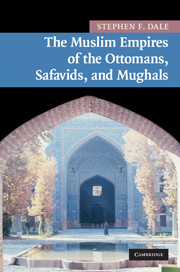Book contents
- Frontmatter
- Contents
- List of illustrations
- List of maps
- Preface
- Languages and transliteration
- Introduction
- 1 India, Iran, and Anatolia from the tenth to the sixteenth century
- 2 The rise of Muslim empires
- 3 The legitimacy of monarchs and the institutions of empires
- 4 The economies around 1600
- 5 Imperial cultures
- 6 Golden ages: profane and sacred empires
- 7 Imperial culture in the golden age
- 8 Quests for a phoenix
- Conclusion
- Glossary
- Dynastic lists
- Bibliography
- Index
8 - Quests for a phoenix
Published online by Cambridge University Press: 05 October 2014
- Frontmatter
- Contents
- List of illustrations
- List of maps
- Preface
- Languages and transliteration
- Introduction
- 1 India, Iran, and Anatolia from the tenth to the sixteenth century
- 2 The rise of Muslim empires
- 3 The legitimacy of monarchs and the institutions of empires
- 4 The economies around 1600
- 5 Imperial cultures
- 6 Golden ages: profane and sacred empires
- 7 Imperial culture in the golden age
- 8 Quests for a phoenix
- Conclusion
- Glossary
- Dynastic lists
- Bibliography
- Index
Summary
Introduction
In 1600 the Ottomans, Safavids, and Mughals constituted three of the world's four most successful dynasties. Only the Ming in China ruled over a larger population, possessed greater territory, and controlled more wealth. Monarchs in each Muslim empire faced many difficulties, but European visitors to Istanbul, Isfahan, and Agra and Delhi were nearly all impressed with the vitality of these capital cities and the empires they represented. A century later, however, the Safavids had become afflicted with terminal lethargy, the Mughals' territorial control of Hindustan was atrophying even as their armies reached India's southeast coast, and the Ottomans, having recently failed catastrophically in their second siege of Vienna, were about to enter the Tulip Period, an engaging label for an era of self-indulgence that symbolized the loss of imperial dynamism. In 1722 the Safavid dynasty collapsed; seventeen years later the Mughal emperors degenerated into rulers of a small north Indian state; and in 1774, following a Russian victory, the Ottomans signed the Treaty of Küçük Kainarji, an event that marked the beginning of a century and a half during which Europeans and Ottoman subjects picked apart the empire.
If the fourteenth-century Muslim philosophical historian Ibn Khaldun had been alive to witness the rise and collapse of these empires, he might have commented, philosophically, that dynastic decline was inevitable, because, as he saw in North African tribal kingdoms, the original dynamism of conquerors and social cohesion of their followers inevitably atrophied due to the social, political, and military environment of their newly established states and the changing psychology of members of the dynasty and the ruling elite.
- Type
- Chapter
- Information
- The Muslim Empires of the Ottomans, Safavids, and Mughals , pp. 247 - 287Publisher: Cambridge University PressPrint publication year: 2009

